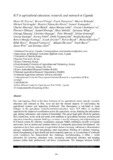| dc.description.abstract | Past and ongoing efforts in the three functions of the agricultural sector, namely; research, education and outreach in SSA, have not had the desired impacts of transforming the agricultural systems and impacting livelihoods. This discrepancy is attributed to weak linkages in the agricultural research-extension-education nexus. ICT offers an excellent opportunity for improved coordination across the agricultural nexus, bridging the information gap, sharing information and creation of knowledge. This paper highlights efforts by partners from institutions, in the north and south, with mandates in agricultural research, extension and education networking towards building a common vision for designing and implementing an ICT-based system for effective coordination amongst NARS institutions initially in Uganda and Kenya then in eastern and southern Africa for sustainable agricultural development. The experiences have been generated in agricultural distance learning, information dissemination amongst stakeholders, and strengthening rural innovations. Piloting of e-distance learning-based strengthening of agricultural and environmental capacities by a consortium of north and south institutions has demonstrated that challenges notwithstanding, it offers a viable alternative for lowering education costs, increasing professional retention and keeping trainees within their professional and home environments. The linkages between NARS partners can be done using a scalable and cost-effective web-based system designed by using simple open source software, Joomla, to cater for the diverse interests of the stakeholders that can be incrementally developed and extended to cover all aspects of agriculture and ensure lifelong learning. Understanding and addressing needs and priorities of societies in complex farming systems is being addressed by strengthening rural innovations capacities in five universities. Interactions so far reveal that the challenges are very similar across the institutions in the region. We propose a model for integrating ICT in agricultural education, research and outreach. There is need to upscale these experiences in order to realize improved and sustainable agriculture. | en_US |

